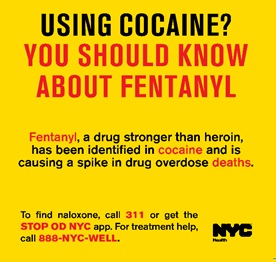Health Department Reminds New Yorkers Who Use Alcohol or Drugs this Holiday to Stay Safe
Alcohol-related emergency department visits spike every year on New Year’s Day
Fentanyl — a highly potent opioid — has been identified in the New York City drug supply
December 31, 2019 — As New Year’s Eve celebrations begin tonight, the Health Department reminds New Yorkers to take care of themselves and others. Alcohol-related emergency department visits more than double on New Year’s Day every year in New York City.
In addition, in recent years fentanyl—a highly potent opioid—has been identified in cocaine, heroin, ketamine, and methamphetamine. Fentanyl has also been identified in benzodiazepines (such as Xanax or Klonopin) and opioid painkillers (such as Oxycodone or Vicodin acquired from non-pharmaceutical sources). People who use cocaine occasionally are at exceptionally high risk of overdose because their bodies have not developed a tolerance for opioids such as fentanyl.
"Overconsumption of alcohol and drug use comes with risks, and we want New Yorkers to know how they can reduce their risk," said Health Commissioner Dr. Oxiris Barbot. "Taking these precautions can save lives. New Yorkers who want help with drug or alcohol use should also know that support and assistance is available."
To help New Yorkers keep themselves and their loved ones safer, the Health Department offers the following tips:
Tips to prevent fatal overdose
- Avoid using drugs alone, or have someone check on you who can call 911 in case of an overdose or emergency.
- Avoid mixing drugs. Using different drugs together, including alcohol, increases your risk of overdose. If you do, go slow and use a small amount first.
- Carry naloxone, an emergency medication that can reverse an overdose from heroin and other opioids, including fentanyl. When using drugs, leave naloxone out where others can find it.
Tips for safer alcohol use
- If your New Year’s celebration includes alcohol, decide ahead of time how much you plan to consume.
- Eat dinner before the party starts and enjoy snacks throughout the evening.
- Pace yourself and drink non-alcoholic beverages to stay hydrated.
- Be mindful of the medications you are taking and if they may increase the effect of alcohol on your body.
“Although fentanyl is present in a small proportion of the cocaine supply in New York City, people should know if they use drugs containing fentanyl, they are at increased risk for overdose,” said Senior Director of Research and Surveillance Dr. Denise Paone.

The City is committed to helping New Yorkers access naloxone. New Yorkers can download the free mobile app Stop OD NYC to learn how to recognize and reverse an overdose with naloxone. The app also links individuals to nearby community-based programs and pharmacies where naloxone is available without a prescription. The Health Department also offers regular naloxone trainings, which teach New Yorkers to recognize the signs of an overdose and respond by calling 911 and administering naloxone. The trainings are free, and all participants are offered a free naloxone kit.
If you witness an overdose, call 911 immediately.
New Yorkers can find more information about alcohol and their health. Individuals seeking support or treatment for alcohol or drug use issues for themselves or their loved ones can contact NYC Well by calling 1-888-NYC-WELL, texting “WELL” to 65173, or going to nyc.gov/nycwell. Free, confidential support is available at any hour of the day in over 200 languages.
###
#068-19
MEDIA CONTACT: Patrick Gallahue/Stephanie Buhle, (347) 396-4177
pressoffice@health.nyc.gov





